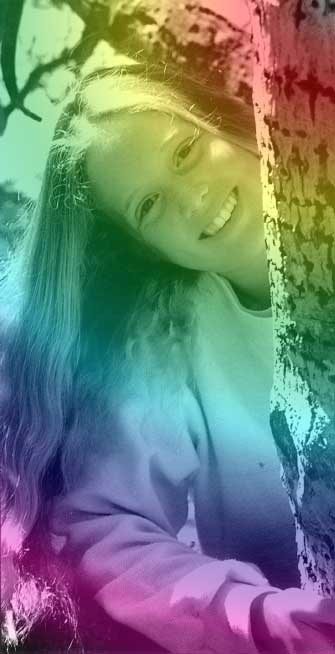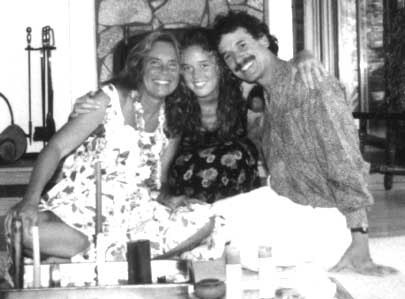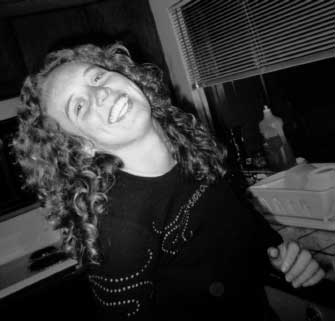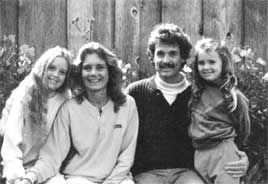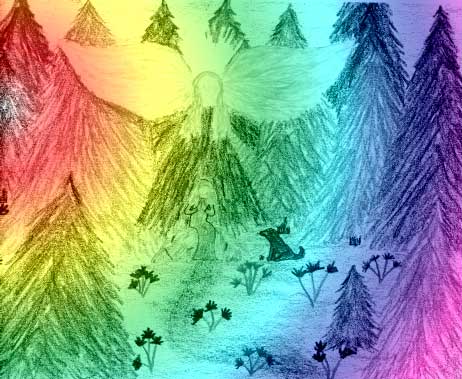THE INNER LIFE OF A CHILD
AN INTERVIEW WITH RAMI VISSELL
|
|
Rami
at age eleven,
Back cover photo of Rami’s Book:
The Inner
Life of a Child
Photo by Doris Buckley
As I am always learning from life,
so too do I wish to share
what I have discovered along the way.
This is my story.
|
By the time I was eleven years old my parents
had written three books. They had encouraged me to write ever
since I was a little girl, and so I was always creating little
books. One day my mom said to me, “Well, why don’t
you write a book that we can publish?” To my eleven-year-old
mind, that seemed like a great idea. I had no idea about the
complexities of writing a book and publishing it, printing
it and distributing it, so I said ok. My mom was the one who
really worked with me. She reminded me of what a special upbringing
I had. She said that there are so many people who would be
inspired by hearing my story. So I started to write. What
ended up coming out was the story of my very unique upbringing—unique
in that I had two parents who really loved me and cared for
me and gave me the opportunity to really know myself. They
instilled in me a deep compassion for all life and a desire
to serve and love in any way I could throughout my life.
I am looking at the pages of this book and smiling because
it’s very sweet and innocent. Even though I wrote it
so long ago, I still get letters from people. They say that
even as adults it helps them and reminds them to simplify
their life and to take time to get to know themselves, to
spend time in nature and remember to be aware of the beauty
in life.
Prior to writing this book I had been in a Waldorf School.
That is where I came to love art. When I was nine, ten and
eleven my parents had me in home school. They would teach
me in the morning. A big part of my education was writing
my book. In the afternoons I would go out and learn from nature.
I would basically spend the whole afternoon romping around
through the woods and meadows around our house and be carefree.
Having that freedom to play is a gift that is still with me
at twenty-four. Play and fun are so important.
The first chapter is called “Loving Yourself.” As
a girl, I loved myself. I loved myself in the sense that I
had respect for who I was and what I wanted to do in my life.
I had confidence in who I was as a human being. Some people
think that loving themselves means being obsessed and full
of themselves, but that is not so. To love yourself is simply
to love the person that you are inside and out.
The chapter called “My Sister in the Heaven World”
is about my mom having a miscarriage when I was about ten.
That was my first experience with death. My Mom and Dad taught
me about how this little girl, this little being, was living
on in the spirit world and was like an angel, a constant guide
and friend in our lives. I learned that death and birth are
almost one and the same in some ways. When one thing dies
a new one is born—through the constant change and transformation
of things.
Each chapter has a little lesson that I learned in my life.
The next chapter is “The Hidden Blessing.” At eleven,
right before I started to write the book, I had broken my
arm. I was very, very—shy-extremely shy and it was very
hard for me to talk to people. When I broke my arm, people
would ask me, “How did you do it?” At first I would
want to run away and hide and not tell anyone, but eventually
I was able to talk about it. It was not just a simple “I
fell down” type story; it was long and complicated. By
the time I got my cast off, I realized that I had gotten a
lot more comfortable talking in general. From that experience,
I learned that whenever something bad happens, something good
can come out of it.
Going back and reading my book reminds me not to complicate
life, to be simple, to learn and grow from what occurs every
single day. We can make the choice to pass over our experiences
or to really look at them and learn. That is always the choice
we have.
STEPPING OUT OF THE GARDEN
I’m working on a second book now and have been for a
number of years. My first book left off when I was eleven
years old, but as I entered into the transition time from
childhood to adulthood, some painful things happened to me.
Now I am writing about what I learned from that pain and what
I have been able to take away from it. I want to honor the
teenage years as a beautiful time. It can also be a time of
confusion and fear and of self-exploration and I want to honor
it for all that it is.
When I was very young, I could see angelic beings. I think
this is very easy for children. Many adults are confused by
this, but my parents encouraged me. I can remember lying out
in a field of flowers and experiencing divine magic all around
me. I didn’t really know what it was and didn’t
really care because I wasn’t separate from the experience.
My spiritual life has always been very important to me. I’ve
found a real passion in Native American spirituality, in connecting
with the Earth and seeing how all things are interrelated.
I’m still shy in a way, but I am grateful for that, because
I know how to go off and be alone. That is very important.
Part of my shyness was because I didn’t have much contact
with people. My parents lived way out in the country and were
into meditating and their spiritual practice. They didn’t
spend a lot of time around people so I didn’t really
learn to be around people until I was older. Another reason,
I think, is that I had such a vast spiritual life myself.
It had to do with being in my own world—a world that
I really couldn’t tell people about. I was meditating
in my own way. My church was the beautiful outdoors that surrounded
my home. I would loose myself in nature. Peak experiences
and feelings of being high were natural to me.
When I got into high school, I was still pretty shy. One of
my teachers said to me, “You know you have a problem.
You’re shy, you can’t go through life like that.
You’re going to run into all sorts of hassles. This is
a handicap.” I remember being saddened by this. He said
he could help me become more aggressive and out there in the
world. I remember thinking, “I don’t want to do
that. Yes, it would be nice to learn to be more comfortable
saying what I want, when I want in front of people, but I’m
never going to lose my inward sense of myself. Being quiet
and inward is a gift that helps me in life.” When he
said that, I told him, “I like being shy.” Maybe
shy wasn’t a good word to use to a person like him. Maybe
I should have just explained that I value my ability to be
alone and introspective. So over the years I have learned
to balance this natural quietness with being more outward
in the world. Balance is key. Being able to tell people about
my inner life as I did in writing this book was part of this
balance.
Before high school, I went to a full on public school. Although
that was a shock, it was a wonderful school. Since being home
schooled allowed me to be a child much longer than most kids,
when I went into public school I said, “Okay, I’m
ready to enter this world of school and really learn.”
I immediately became a straight A student. I look at that
as very important. Then I attended an amazing private school—Mount
Madonna High School. I feel lucky about the variety of my
education and wouldn’t change any of it because each
school experience taught me something different.
Aside from the challenges and joys of school life I was going
through other painful, but growthful experiences. A lot of
young girls are exposed to inapropriate sexual stuff and boys
too I’m sure. I guess I can say it—I was molested
when I was fourteen by a man twenty years older than I was.
That was a tremendously scary time for me. Because I trusted
my parents so much and was so close to them, I was able to
tell them. That was crucial because they were able to stop
it right away. On the other hand, I don’t think they
could have done anything to prevent what happened to me. It
could have been so much worse but the fact remains that I
was molested. I’ve done a lot of healing around that
in my own sexual life and have had to overcome a lot, yet
it still affects me today in painful ways.
The biggest lesson I gained out of that experience was my
knowing that it’s ok to say “No!” I actually
didn’t know that. Maybe I had been taught, but our society
seems to not tell girls in a strong enough way that if something
doesn’t feel right they can say “No!” I was
very young. He was like a teacher to me, and I trusted him
and thought he would know what was best for me. I wrote what
I think is a very powerful chapter in my second book that
talks about the importance of saying “No!” My hope
is that if even one young person gets the message, then I
have done a service.
I had been very sheltered as a child and although that was
good it has also been a challenge. My parents educated me
about the whole cycle of life including sexuality. They were
very good about that, but we didn’t have a television,
and I didn’t really learn about the harshness of this
world until I was molested. Looking back on this experience,
though it caused me a tremendous amount of pain, I can also
say that the important lesson I learned has been a gift. Now
when I work with teenagers and they tell me their stories,
I can relate with more understanding. I can feel exactly how
they feel. I have learned tremendous compassion.
DRUGS: A CHOICE
From a very early age my parents gave me an educational talk
about drugs. They also did something that I think everyone
should know about. They said, “We can tell you until
we are blue in the face how wrong drugs are for you, but you
are your own person. If you want to try them, that is your
choice.” They said, “But if you ever do, talk to
us first. If you’re really intent on doing this, we would
rather that you come to us and we’ll get you the right
drugs if we can. We’ll make sure you have a safe experience
instead of you going off on your own with unknown people and
maybe getting into a lot of trouble.” That has always
stuck with me. I’ve never once used drugs. I don’t
smoke. I don’t drink. I don’t do anything like that
and I never really felt the need to rebel, because my parents
never gave me anything to rebel against. They supported me
in such a loving way and also gave me total power over my
life and choices.
In one past relationship when I was nineteen, ironically,
my boyfriend was using a lot of drugs. I wasn’t aware
of that until later. Finally I said, “I won’t do
drugs, but I will be here for you and support you in getting
your life back under control. I’ll also let you know
how I feel about this and what is right for me.” Eventually
that relationship ended. He wouldn’t change and I realized
I couldn’t change him. He had to want to do that on his
own.
HEALING RELATIONSHIP
I’ve had somewhat unhealthy relationships with men in
the past, nothing terrible, but now, I’m in an incredibly
beautiful relationship. We each have challenges that we are
working on. That’s good, because we can sit down and
say, “Look, here is my wounding and there is your wounding.
Let’s work together and heal each other by loving each
other.” It is a beautiful treat to be with someone in
a healthy relationship. We share so much in common and can
communicate about everything. We are both in the field of
psychology, we climb mountains together and we have the same
goals and desire to serve. We will probably always be together.
One of the first times we spent time together, we shared our
dreams about what we want to give to this world. We were both
surprised at how similar they were. That has been really been
incredible for our relationship. I am very in love with him.
|
|
Rami
with her parents Joyce and Barry Vissell Photos provided |
TEACHING AND LEARNING AS ONE
I’m realizing more and more by looking at my own life
and looking at people around me, how beautiful everyone is
and how much we all have to teach each other. You couldn’t
have everyone in the whole world write a book about their
lives, but it would certainly be amazing to hear people stories.
If you can find the deeper meaning, you will always be happy,
even in times of suffering. You can always drop down into
yourself and find that deeper meaning and purpose. You can
always ride that inner calm right through the storm.
When I finished my undergraduate work at the University of
California in Santa Cruz, I wanted to do a PHD program but
I didn’t want to go the traditional route—spending
five or six years putting a bunch of stuff into my brain.
I wanted to explore the deeper meaning and purpose of life.
The Institute of Transpersonal Psychology in Palo Alto does
that. I just finished my first year there. It was very experiential.
We did a lot of meditating and bodywork and learned the basics
of how to be with people—so much more than is offered
in traditional talk therapy intellectual schooling. We are
learning how to nurture each other’s souls and find the
deeper essence of who we are. A lot of the year was spent
working on ourselves. You can’t begin to be with someone
else until you can be with yourself. That was what this year
was about. Next year we will get into more practical stuff.
Yet underlying all practical therapy is this goal of knowing
yourself—your inner self, your spiritual self. It’s
the transpersonal way, going beyond the person.
A PATH OF SERVICE
As far as my goals for the future, I simply want to serve.
It brings me so much joy when I can give something of myself
to someone else—even by just making someone smile. That
lights my fire. A private practice would be wonderful—using
my own methods (which are still formative). I’m also
incredibly interested in the outdoors. I’ve taken a lot
of kids into the wilderness and adults too. I enjoy seeing
what it does to people. Just by getting away from the everyday
happenings of the city life and being among the mountains,
rivers and deserts, you have to look at yourself. My goal
is to do some type of wilderness therapy. This idea opens
up vast possibilities.
I’m not a mainstream type of gal. I love arts and working
with kids and animals too. Sometimes talking is a waste of
time in a therapeutic setting. With art, drawing and movement,
you can go so much deeper.
My parents are beautiful models for me. They don’t do
the wilderness part but they do incredible groups, one-on-one
therapy, and couple counseling. Just a few weeks ago they
had a five-day couples workshop in their home that I went
to with my partner. I had been a part of their workshops here
and there, but never for five days. They are amazing. It is
so inspiring to watch them. They really have a gift for working
with people.
I have been working for almost two years at a group home—a
residential treatment center for adolescents. It is level
fourteen, which is just a step down from the psychiatric hospital,
so it’s pretty intense. We deal with a lot of emotional
and behavioral disorders.
We actually have a lot of freedom in our work and as an informal
therapist, I can have a lot of input. I can pretty much run
whatever kind of group I see as important. For example, I
did a yoga group. At first, the teens were a little weirded
out by it, but they really got to like it.
I work an eight-hour shift at night. Most nights a lot happens
and it’s a hard job—especially when working with
kids who are highly suicidal. When they are having flashbacks
and hearing voices that tell them to kill themselves and to
do all sorts of other stuff, you have to be there with them
through intense processing. Other times it’s mellow and
you can take the teens out and play with them. You can have
fun.
This job compliments my education nicely. For example, when
something comes up in a class and a question is asked such
as, “What exactly is an oppositional-defiant child,”
I know, because I have the experience at work.
I’m mostly doing this work because I want to learn and
to give these teens love. I feel that is what they need and
what most of them have never received. Most come from very
disturbed families who have messed them up—parents, foster
parents, caregivers and other people in their lives. Some
of them won’t ever lead a normal life like you or me
and will probably be in treatment centers for the rest of
their lives. But some of them make beautiful recoveries while
they are in our care and go on to a somewhat normal life.
Sometimes I’m dealing with one of these young people
and I think, “What should I do and what should I say?”
But there is really no magic formula to what I can say or
do. Love is the most important thing.
Many of these kids come in feeling down on life, down on their
family and complain about all they don’t have. Sometimes
I have them do a little exercise—take two pieces of paper
and write down everything they hate about their life on one
paper and on the other paper, they write down what they are
grateful for and the good things in their life. This can be
as basic as food and a place to sleep. Then we take the negative
things and do a little ceremony and we burn it. I say, “Leave
these negative things behind for now. This ceremony gives
you a break from them. Let the smoke just carry them away.”
Then I have them bring up the other paper and look at what
they are grateful for. They really like that. The exercise
gets them to focus more on the positive.
Even if they have been dealt a nasty hand, its there choice
how they are going to deal with it. It’s really hard
when a kid has been abandoned by their parents and placed
in foster homes. Nothing seems to be working out and they
have no idea where they are going to go, what they are going
to do or who is going to take care of them or love them. That
is hard! Ultimately they have the choice to give up or to
take on the challenge. If they have the outlook that things
can be better, then they know they can stick it out.
We discuss how our core assumptions either empower us or victimize
us. I have seen a lot of these kids turn their life around,
go to a good placement and do well because they choose to.
Before they were struggling and getting into a lot of trouble
because they didn’t care or believe they could change
things. Finding meaning and a life passion is all-important.
Recently we had a fifteen-year-old girl who was highly suicidal.
Her life had been so bad. We discovered that she loved working
with little kids and was very good at it. We got her involved
in a volunteer program working with little kids. The transformation
we have seen in her has been beautiful. She is doing something
she really loves and is giving back to the community.
Meeting other children who had a great childhood and have
amazing parents is beautiful and gives me hope. They are teaching
and serving others from their experience. Other kids who have
had a horrible childhood are teaching a lot too. My parents
have always said that although they teach me, I also teach
them. That can happen all the time between every one of us.
That’s the ideal.
From Rami’s Book:
FAMILIES ARE WONDERFUL
|
|
From
family album:
Rami, Joyce, Barry and Mira Vissell |
“I have a loving mother and father, a
little sister Mira who is six and a sister in the heaven world."
I helped Mama by playing with Mira. I taught her to sit up
by herself and then to crawl. Then I started teaching her
how to talk and then how to walk. It was also my job to feed
Mira her cereal. I laughed at how messy she was. Because I
helped every day Mama had a special time with me while Mira
napped. Soon I got to see that life was more fun since Mira
came. Mira became my little friend and I taught her all of
my favorite games. Sometimes she even called me Mama. That
made me feel very important. When she started talking a lot
I was the only one who knew what she was trying to say. When
she didn’t want her supper, I’d pretend I wanted
it and then she’d eat it all up.
Now that she is six years old we play a lot together. When
we go places with our parents and there are only adults, I’m
so glad Mira is around so we can play. Sometimes after dinner
Mama and Daddy start talking about business and it is very
boring. Mira and I go off then and start to giggle and pretend
we are animals. We try and get Daddy to join us because he
is a very good tiger.
Sometimes Mira and I fight and then it’s not much fun
to have a sister. Then I wonder if it would have been better
if she would have never come. But soon the fight is over and
we giggle again. It can be real hard with Mira, but mostly
it’s fun. I’m glad I have a sister.”
From Rami’s Book
THE MOTHER THAT IS ALWAYS THERE
|
|
Illustration
from Rami’s Book: The Inner Life of a Child,
written and illustrated by Rami Vissell |
Did You know that you have a beautiful mother
that is always loving and caring for you? She is there even
when you feel like you are alone. You can’t always see
her, but you can feel her love in your heart. She is our Heavenly
Mother, and is a mother to all of us. Knowing how much She
loves you can make you feel good all over.
When I was a little girl my mother started telling me about
all the heavenly beings that looked after me. She especially
talked about my Heavenly Mother. It didn’t really make
sense to me. It was hard to believe that I had a Heavenly
Mother that loved me when I could see my own mother.
I thought my own mother could do everything and would always
be there. My mother told me that sometimes she couldn’t
always be there but that my Heavenly Mother could. She told
me that whenever I needed help I could pray to Her. It was
hard for me to understand but I trusted that my mother was
telling the truth.
When I was six I found out for myself that my Heavenly Mother
is always there. We went on a camping trip to our favorite
lake. We were totally alone. My sister Mira was just a new
baby and needed lots of care and attention. My mother and
father were very busy with Mira, so I often played alone with
our dog Kriya. One day while Mira was crying and my parents
were changing her diaper, I decided to get some peace and
quiet. I called Kriya to come for a walk. We went through
the meadow and crossed a little stream. I played at the stream
for awhile and then continued up the meadow. I picked wild
flowers as I went. Soon I came to a woods and kept walking.
Kriya followed and I felt very happy. I even skipped a little.
After awhile, I felt I should go back to our camp spot. I
looked around and discovered I was lost. I had no idea which
way to go. Everything looked the same. I asked Kriya how we
should go back. She lay down and just looked up at me. She
wanted more of an adventure. I knew she wouldn’t help
me get back home.
I sat down on a rock and started to cry. Kriya came very close
to comfort me. After a while I realized crying wouldn’t
help so I started screaming as loud as I could. The screaming
didn’t help either because my parents couldn’t hear
me.
Then I remembered what my parents had said about my Heavenly
Mother. I thought I would try asking for Her help. I closed
my eyes and tried to imagine what a Heavenly Mother would
look like. Then I asked if She would please help me to get
back to my parents. I sat with my eyes closed for a short
time trying to hear Her talk to me. I couldn’t hear anything
except the singing of birds and Kriya’s breathing. But
when I opened my eyes I could hardly believe what I saw. There
was a light golden mist hardly touching the ground. It led
in one direction and I knew I must follow it. It disappeared
behind me as I walked. I felt so light and happy as I walked
along. I followed the golden mist all the way back to our
camp. When I looked back there was nothing but the meadow.
I ran to my mother and hugged her tight. Mira had cried a
long time and had just fallen asleep. My parents had just
started looking for me. We were all very happy. Now I know
that I do have a wonderful Heavenly Mother. We all have the
same great Mother and she is always with us.
At other hard times in my life she has come and comforted
me. She comes to me in happy times too. She comes whenever
I need her. She is always loving me and loving you too!

